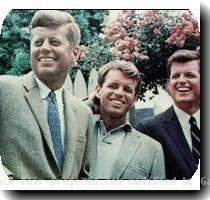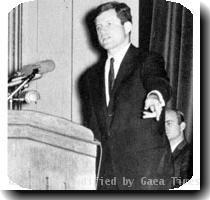Democrat hoping to fill the late Edward Kennedy’s seat avoiding family’s political mystique
By Steve Leblanc, APSunday, December 27, 2009
Democrat eyeing Kennedy seat avoids family legacy
BOSTON — Attorney General Martha Coakley may be the front-runner in the race to fill the late Edward Kennedy’s U.S. Senate seat, but she is crafting a campaign largely free of the Kennedy mystique.
Although she shares Kennedy’s position on key issues and is appealing to the same liberal Democratic voters who returned him to office during his 47 years in the Senate, Coakley is helping usher in a post-Kennedy Massachusetts — a state whose politics have been inextricably linked to the family for generations.
Unlike her three Democratic rivals in the recent primary, Coakley refrained from invoking Kennedy’s name or image in her television ads, instead focusing on her personal history, record as attorney general and legislative priorities.
Coakley, who faces a Republican and Libertarian challenger in a Jan. 19 special election, said playing down Kennedy’s persona during the campaign was a simple acknowledgment of the titanic role he played in the politics of Massachusetts and the nation.
“We just felt that no one could replace Sen. Kennedy, that he was such a larger-than-life character and so down to earth,” Coakley said in an interview with The Associated Press. “Someone was going to fill that seat, but it wasn’t going to be anybody even close to his legacy and his talent and his experience.”
Coakley said she’s acknowledging another fact — that Kennedy’s death necessarily opens “a new day” in Massachusetts’ politics.
“It was daunting and humbling to even be running for this seat, so I thought I can’t really pretend to be Sen. Kennedy,” she said. “I can certainly aspire to follow in his footsteps.”
While she’s avoided using his image in ads, Coakley has mentioned Kennedy at some public appearances. She referenced his battles against discrimination to frame her opposition to the Defense of Marriage Act, which denies federal benefits to married gay couples in Massachusetts.
But Coakley’s efforts to avoid direct comparisons with Kennedy is also helping focus attention on her own story — one that includes breaking political gender barriers in a state that considers itself one of the most liberal.
The 56-year-old was the first woman elected to the state’s highest law enforcement office. If she succeeds Jan. 19, she’ll be the first woman elected to the U.S. Senate from Massachusetts.
Coakley’s attempt to move past the Kennedy legacy was evident early on.
She was the first to declare her candidacy after his death and had quietly begun exploring a run well before he died, at the risk of alienating the Kennedy family. She also declared she would run even if another member of the family, including former U.S. Rep. Joe Kennedy, opted into the race. Kennedy decided against running.
In February, Coakley divulged to the AP the existence of a previously undisclosed bank account that she had used to conduct polls to test her U.S. Senate prospects for more than four years.
After her primary win, the Kennedy family issued a statement congratulating her and saying they had “every confidence” she will win in January. Kennedy’s widow, Vicki, and the late senator’s sons hadn’t endorsed anyone during the primary.
In the four-way Democratic primary, Coakley, the only candidate with a statewide organization, garnered nearly half the vote.
That organization, and the fact the Coakley is the Democratic nominee in an state that overwhelmingly elects Democrats to state and federal office, makes Coakley the presumed frontrunner.
Her Republican challenger, state Sen. Scott Brown, has described himself as the underdog in the race and said that while he differed with Kennedy on many issues, he also found areas of agreement, including Kennedy’s opposition to Cape Wind, a proposal to build 130 wind turbines in Nantucket Sound. Coakley supports the plan.
“I had great respect for the senator as many people did. He was my senator, too,” said Brown, a 50-year-old lawmaker and lawyer.
Brown is also critical, saying the Democratic Party has drifted too far left from the party of Kennedy’s brother, President John F. Kennedy.
“When I go around the state, people are saying, ‘You know what? This isn’t JFK’s party anymore,’” he said.
A third candidate in the race, Joseph L. Kennedy, is a Libertarian running as an independent.
Although he’s no relation to the late senator, having a Joe Kennedy on the ballot could confuse some voters who might mistake him for Edward Kennedy’s nephew, the former U.S. Rep. Joseph Kennedy.
But Coakley is convinced he poses more of a problem for Brown and has insisted he be included in debates. Brown initially pushed for one-on-one debates with Coakley.
Coakley’s steady focus on higher office served her well in the campaign and in her long public career, according to political observers.
“Martha Coakley has been clear about promoting Martha Coakley as an effective public official,” said Paul Watanabe, a political science professor at the University of Massachusetts-Boston. “She has run principally as the centerpiece of what she is offering the electorate. She is not running on picking up the baton after Sen. Kennedy’s death.”
As a woman, Coakley would have had a hard time matching Kennedy’s more gregarious, backslapping political nature, according to Carol Hardy-Fanta, director of the nonpartisan Center for Women in Politics & Public Policy at the University of Massachusetts-Boston. Instead, Coakley has been wise to play to her strengths as a seasoned prosecutor who has spent her life building up her own political resume, she said.
“She is clearly someone who went into the race very well prepared to take control of the race and to say ‘I’m running, I planned to run, I’m ready to run and I can win this,’” Hardy-Fanta said.
Kennedy died Aug. 25 of a brain tumor.

